PNRI Hosts Balik Scientist for Nuclear Medicine
- Details
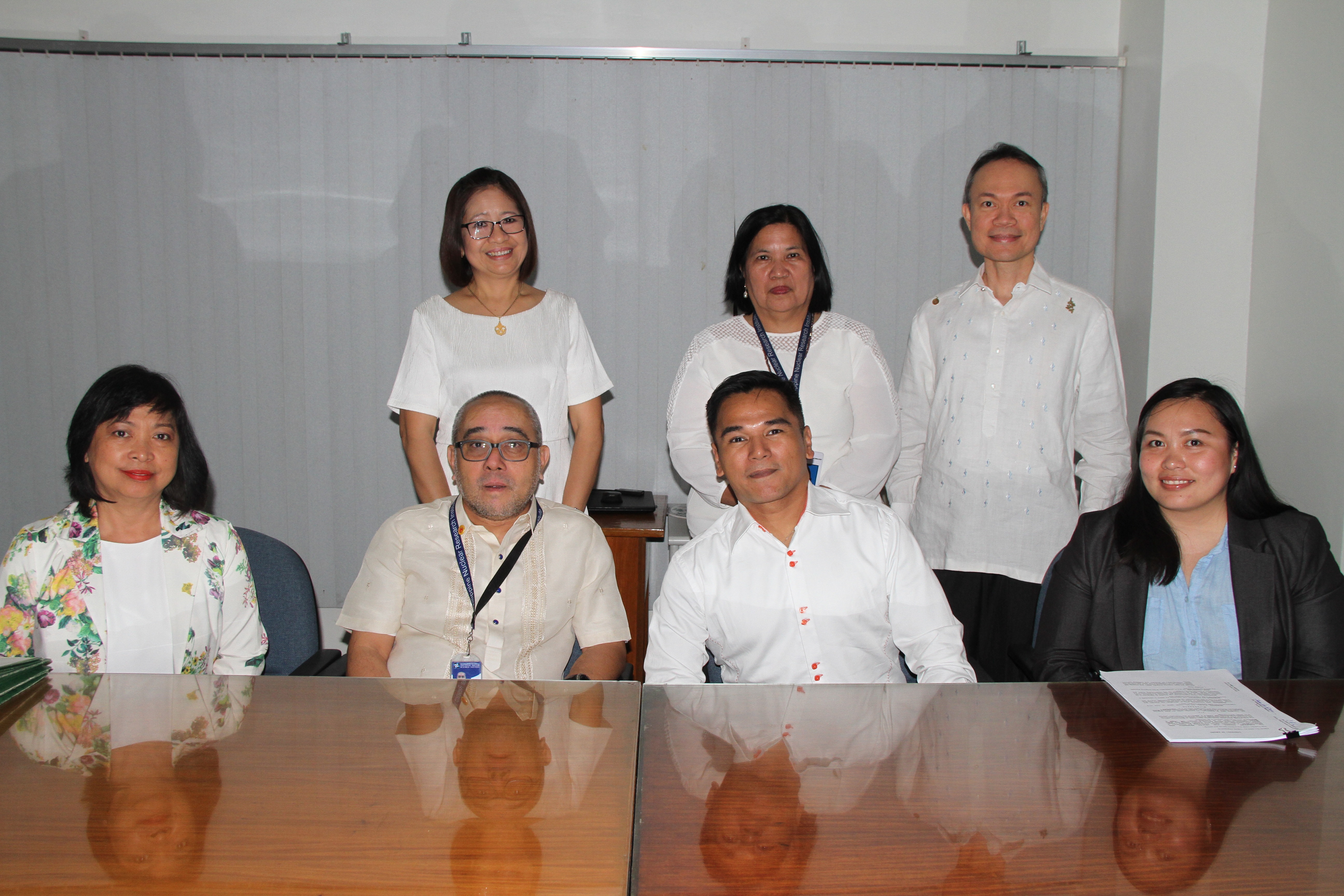
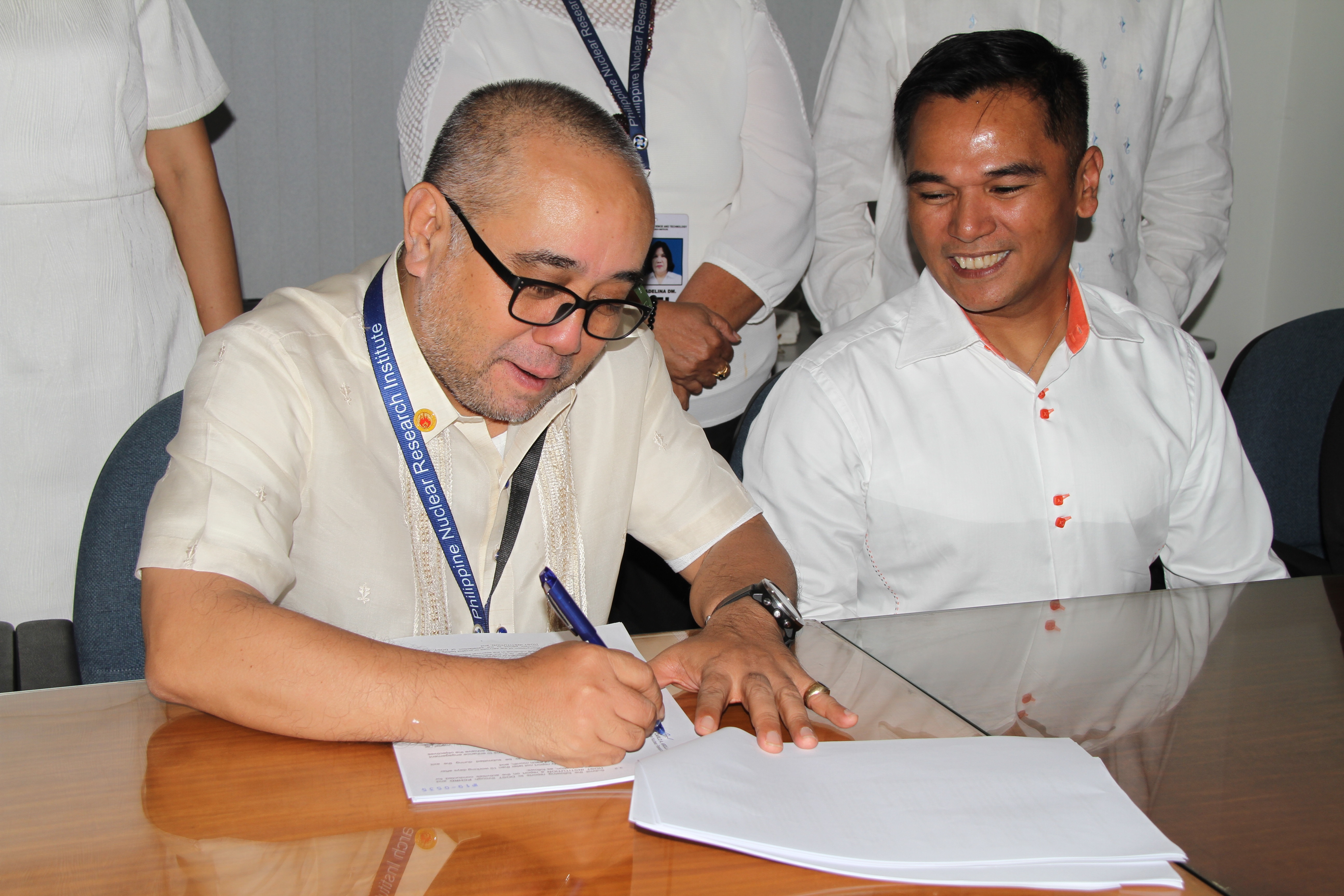
PNRI Hosts Balik Scientist for Nuclear Medicine
Dr. Thomas Neil Pascual (bottom photo, right), formerly of the International Atomic Energy Agency (IAEA) signs a memorandum of agreement (MOA) for the Balik Scientist Program with Dr. Carlo A. Arcilla (bottom photo, left), Director of the Department of Science and Technology - Philippine Nuclear Research Institute (DOST-PNRI) at the PNRI compound in Diliman, Quezon City.
An expert in nuclear medicine, Dr. Pascual will collaborate with PNRI under the national health R&D agenda in the field of nuclear and radiation applications in medicine.
He joined the IAEA in 2012 and was in charge of capacity building projects in Africa as well as in Asia and the Pacific region.
His pioneering work in nuclear medicine includes the establishment of the first nuclear medicine facility in Cambodia and the conduct of nuclear medicine training at the St. Luke's Medical Center.
The Balik Scientist Program is an initiative of the DOST since 1975 that aims to encourage Filipino, experts, scientists and researchers based in foreign countries to return to the Philippines and contribute their expertise to the improvement of various fields and sectors.
PNRI Features Nuclear S & T at the House of Representatives
- Details
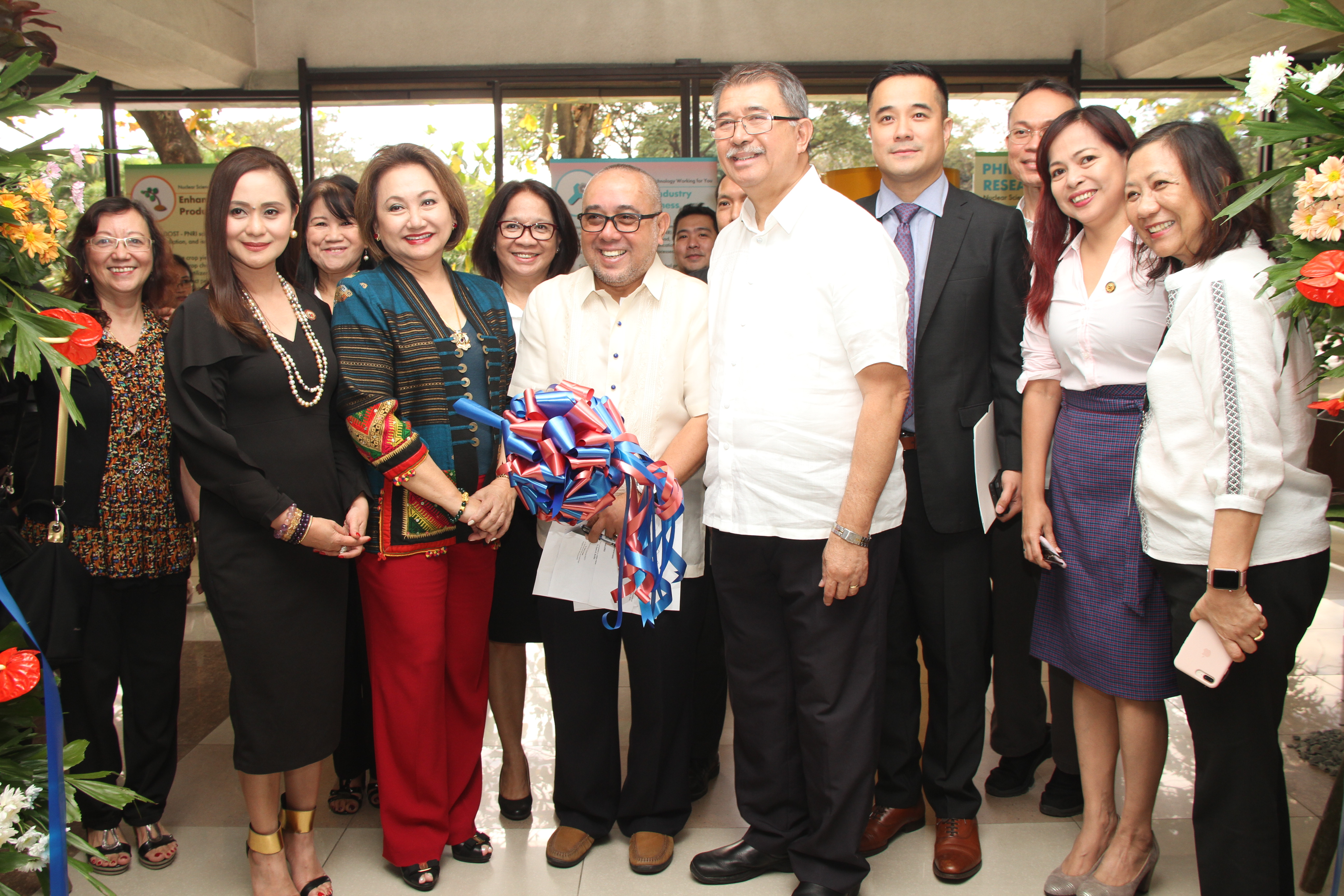
House Deputy Speaker Linabelle Ruth Villarica and Representatives Francis Gerald Abaya and Arlene Arcillas are joined by DOST Secretary Fortunato De La Peña and PNRI Director Dr. Carlo Arcilla during the opening of the Nuclear Science and Technology Exhibit at the North Wing Annex of the House of Representatives on January 28, 2018.
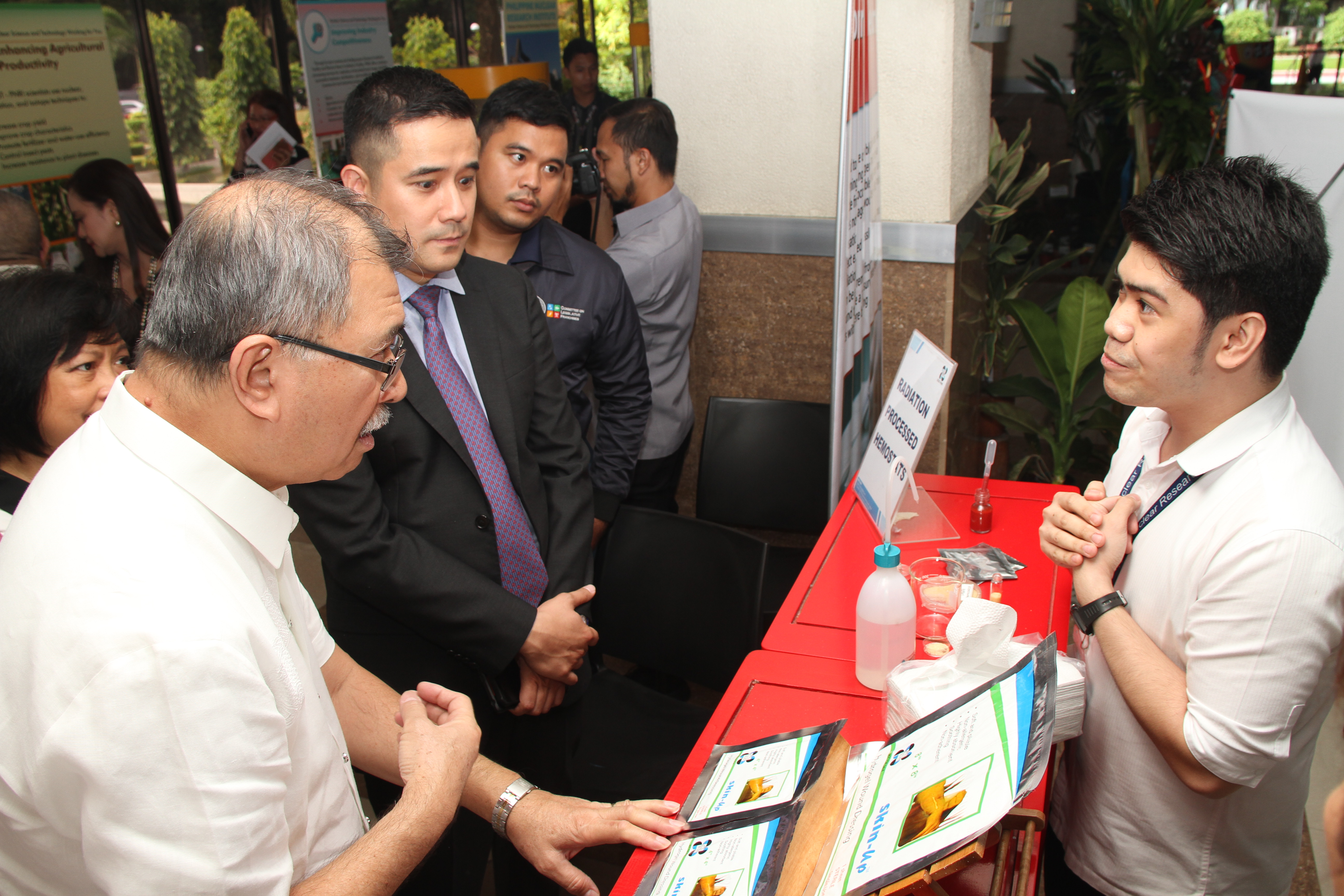
DOST Secretary Fortunato De La Peña and Representative Francis Gerald Abaya listens intently as a PNRI researcher explains the benefits and advantages of the PNRI-developed Hydrogel Dressing for burns, wounds and bedsores.
PNRI Features Nuclear S & T at the House of Representatives
Featuring the latest Filipino-developed nuclear and radiation applications to the very halls of the Philippine legislature, the the Department of Science and Technology – Philippine Nuclear Research Institute (DOST-PNRI) held an exhibit on nuclear science and technology on January 28-30 at the North Wing Annex of the House of Representatives.
The nuclear S & T exhibit was hosted in coordination with the House Committee on Science and Technology, chaired by Representative Erico Aristotle Aumentado.
DOST Secretary Fortunato De La Peña and PNRI Director Dr. Carlo Arcilla were joined by several representatives during the opening of exhibits on January 28, particularly House Deputy Speaker Linabelle Ruth Villarica as well as Representatives Francis Gerald Abaya of the 1st District of Cavite, Arlene Arcillas of the 1st District of Laguna and Strike Revilla of the 2nd District of Cavite.
The lawmakers expressed their strong support for measures that will ensure the safe and peaceful uses of nuclear science in the country. In particular, the House has already passed on third reading the bill for the Comprehensive Nuclear Regulation Act, aiming to establish an independent nuclear regulatory body for the Philippines.
“Beyond serving as a showcase of Filipino ingenuity, this exhibit also serves as a wake-up call to us lawmakers to be more supportive to the research and development sector,” said Representative Abaya, who delivered the keynote address during the opening ceremonies, and was one of the earliest authors of the consolidated bill.
“I am confident that through this exhibit, the legislators and staff can better appreciate the role of science in general, and more so by nuclear and radiation applications, in contributing to the collective prosperity of our country,” he said.
Among the technologies featured by PNRI are its award-winning Carrageenan Plant Growth Promoter which increases the yield of crops, development of mutant varieties of plants with improved qualities, radiation-processed medical products such as Hydrogel Dressing for burns, wounds and bedsores and radiation-processed hemostats for stopping bleedings.
PNRI also presented its service facilities such as the Cobalt-60 Multipurpose Irradiation Facility, the Electron Beam Irradiation Facility, as well as its regulatory functions and emergency preparedness and response capabilities.
Year 2 - Project STRIVE with DOST-PNRI and DepEd-QC
- Details
Year 2 - Project STRIVE with DOST-PNRI and DepEd-QC
The Department of Education – Schools Division Office, Quezon City once again partnered with DOST-PNRI as it launched Year 2 of Division Project STRIVE (Science, Technology, Research in Innovative Venture) involving the selected elementary and secondary students in Quezon City at the Quezon City Science Interactive Center.
The students selected to participate in the activity are the best in science in their respective schools or winners in national, regional and international science contests.
Project STRIVE consists of twenty (20) Saturdays, and includes Nuclear Science Education, facilitated by experts from PNRI, as one of the major topics for the seminar-workshop, along with the fields of Science Investigatory Project (SIP), Science Improvisation, and Robotics.
Around 120 students were taught the basics of atomic structure and radioactivity, radiation protection, environmental radiation monitoring, nuclear and radiation applications in agriculture, chemistry, biomedical research, analytical techniques, and nuclear emergency preparedness and response.
During the 46th Atomic Energy Week Celebration last December 2018, Quezon City Councilor Precious Hipolito-Castelo acknowledged the role of Project STRIVE in the city's efforts to become a leading science and technology hub in the country.
PSHS Partners with PNRI in Nuclear Education
- Details
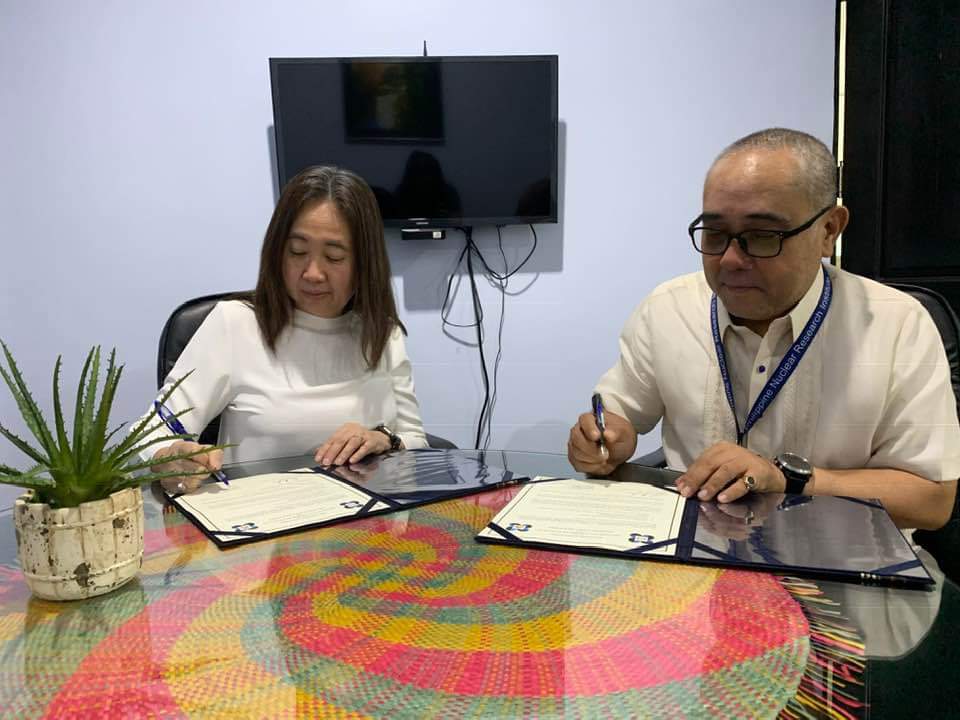
PSHS System Executive Director Dr. Lilia Habacon with PNRI Director Dr. Carlo Arcilla signing the Memorandum of Understanding between PSHS and PNRI on November 23, 2018 at the PSHS Main Campus in Quezon City. The MOU provides for cooperation in scientific research, mentoring and internship programs, and organization of workshops and training courses, among others.
PSHS Partners with PNRI in Nuclear Education
Pushing the frontier of nuclear education by getting the country’s best and brightest students on board, the Philippine Science High School (PSHS) System joins the Department of Science and Technology – Philippine Nuclear Research Institute (DOST-PNRI) in a nationwide project in bringing nuclear and radiation science to secondary school classrooms.
With the signing of a Memorandum of Understanding (MOU) in November last year, PNRI and PSHS will engage in mentoring and internship programs between the high school students and the Institute’s very own scientists and researchers, culminating in joint scientific research programs.
The MOU provides for a five-year cooperative partnership between PNRI and PSHS, commencing in 2019. The two agencies are also looking forward to organize workshops, trainings, symposia, and other academic and cultural activities, particularly this 2019.
PSHS has previously participated in the Nuclear Science and Technology Education Program (nSTEp+) rolled out by PNRI. The NSTEP is an inter-agency partnership between PNRI, PSHS, the Department of Education (DepEd) and the Science Education Institute (SEI) which aims to expand its reach to all the regions in the Philippines, inspiring the Filipino youth through nuclear science and technology.
The program draws rich experience from technical cooperation projects by the International Atomic Energy Agency (IAEA) initiated in 2015, as well as its current project on Educating Secondary Students and Science Teachers on Nuclear Science and Technology, which covers the entire Asia-Pacific region.
PNRI has also signed an MOU with DepEd in the implementation of the IAEA project last February 2018 during the Regional Workshop on Curriculum Development and Launching of Nuclear Science and Technology for Secondary Schools.
During the workshop, in which representatives of 23 IAEA Member States were present, PSHS officials participated along with PNRI and DepEd in the landmark effort to expand the teaching of nuclear science in the Philippines as well as in other countries.












































